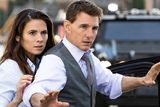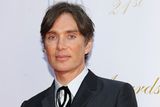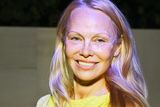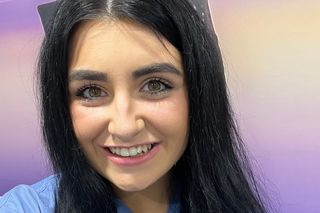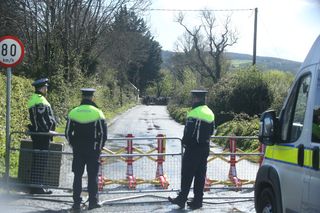Film Review - Michael Keaton and his fall from grace
Film
Michael Keaton is getting rave reviews for a new film which has eerie echoes of his own career. His performance in Birdman has been described as extraordinary and his best work in years, and there's even talk of an Oscar run. It opened in the US last week and will appear here in January.
Alejandro González Iñárritu's film stars Keaton as Riggan Thomson, a paunchy, balding 60-something actor who was a big action star in the 1980s but has now fallen on hard times. He's trying to revive his career by starring in an off-Broadway production of a worthy play, but hovering in the background is the spirit of his most famous character, a superhero called 'Birdman', who mocks Riggan by reminding him how big a deal he once was.
The parallels with Mr Keaton are obvious: his most famous character was Batman, and he's been off Hollywood's A-list radar for well over a decade. But they're also misleading, because while the character he plays in Birdman desperately craves the fame he lost, Keaton is one of the few stars to have very deliberately walked away from the limelight.
In the early 1990s, at the height of his fame, he turned down a $15m deal to star in a third Batman film. Instead he took on roles in films like Pacific Heights that seemed to play against his superhero profile, and by the late 90s had disappeared off the Hollywood radar altogether, retreating to his Montana ranch to fish, ride horses and spend time with his son.
He didn't seem to give a damn about turning his back on it all either, but his gain was Hollywood's loss because Michael Keaton has a rare talent and a uniquely edgy and unpredictable screen presence that can brighten up the dullest movie.
Perhaps his originality stems from the fact that he's a self-taught actor who avoided the usual drama school route and approaches each role in his own delightfully quirky way. It's great to see him back, and by the sound of it other big films are on the way.
Michael Keaton, who describes himself as "half-Irish", was born in Corapolis, Pennsylvania in 1951, but his real name wasn't Keaton at all. He was christened Michael Douglas, a combination that would later become problematic. His mother's name was Loftus, and Michael was raised Catholic. After school he spent two years studying speech at Kent State University before dropping out and moving to Pittsburgh.
After trying his luck as a stand-up comic, he got a job as a TV cameraman at a local television station and soon decided he was on the wrong side of the lens. He began getting bit parts on TV shows and also acted on the Pittsburgh stage and, in the early 1970s, he bit the bullet and moved to Hollywood.
The going was tough initially and when Michael Douglas began landing small parts in cable TV shows like Maude and The Mary Tyler Moore Show, he realised his name was a problem. Stories abound as to why he chose Keaton: was he in love with Diane or a big fan of Buster? Apparently he just liked the sound of it, but it's remained a stage title only and he's never officially changed his name.
When asked about it after he became famous, he liked to point out that there were two other Michael Douglases, "one of whom I hear is doing quite well for himself, while the other is making cheap porn movies - like Basic Instinct."
The newly rechristened Keaton worked solidly but unspectacularly through the 1970s, and also became a regular stand-up at Hollywood's Comedy Store. And after impressing a producer at one of his comedy gigs, Keaton was invited to audition for Night Shift, a 1982 black comedy being made by former Happy Days star Ron Howard.
Howard was astonished by Keaton's wild energy during his audition and immediately cast him as Billy Blaze, a hyperactive morgue attendant who joins forces with Henry Winkler's ex-stockbroker to start a very unusual escort service.
When the film's producers saw the dailies, however, they immediately became worried by Keaton's eccentric performance.
"They were telling Ronnie [Howard] I had to stop chewing gum, I had to get my hair cut," Keaton recently recalled. "Eventually they were, like 'We have to fire him! What the f*** is he doing?' They didn't get it. To Ronnie's credit, he told 'em to wait and see until it was all cut together."
Ron Howard did indeed stick to his guns, and Michael Keaton's extraordinary, live-wire performance in Night Shift launched his movie acting career. He was hard to cast, though, and through the 80s his talents were lost somewhat in solid, straight roles in films like Touch and Go, and Clean and Sober. He was fired from Woody Allen's Purple Rose of Cairo, and turned down the chance to star in blockbusters.
In fact he seemed in danger of falling through the cracks until Tim Burton and Beetlejuice came along. If ever a role was tailor-made for an actor, it was Beetlejuice - the deranged 'bio-exorcist' spook. But in fact Keaton was not Burton's first choice.
He'd originally intended casting Sammy Davis Jr, and lord knows how that would have worked out, but executive producer David Geffen suggested Michael Keaton might be a better bet. Keaton's terrifying, hilarious performance in Burton's wicked black comedy showcased all his talents, and comparisons to Jack Nicholson did not seem misplaced. But comic book aficionados were horrified when Tim Burton then announced that he'd cast Burton as Batman.
Fans worried that Keaton was too small (he's 5ft 10in at a stretch) to play the caped crusader and that his tics and mannerisms would turn the character into a joke. But they were wrong and in Burton's hugely successful 1989 hit Batman, Keaton played the superhero as a quiet, calm and troubled man, and a perfect foil for Jack Nicholson's baroque Joker.
Suddenly, Michael Keaton was the biggest star in Hollywood, but he seems to have been far from comfortable with his sudden celebrity.
His marriage broke down and embarrassing revelations of an affair with porn star Serina Robinson hit the tabloids. He began going out with Courtney Cox and in 1992 returned to the Batman franchise for a decent sequel, Batman Returns, but was already balking at the constraints of playing a superhero.
In 1990 he'd sailed wildly over the top as a seething sociopath who torments a yuppie couple in the ridiculous but enjoyable thriller Pacific Heights.
And In 1993 he gave Shakespeare a pop, playing Dogberry in Kenneth Branagh's Much Ado About Nothing. "I guess it wasn't the obvious way to go if you wanted to carry on being a big star," he said recently.
In 1994, Keaton decided that he did not want to become involved with Joel Schumacher's superhero sequel Batman Forever as he thought the franchise was becoming too light and jokey. And thereafter, he seemed intent on sabotaging any notion of his being a matinee idol or romantic lead.
He sought out more demanding roles, playing four different versions of the same character in the underrated Harold Ramis comedy Multiplicity (1996) and impressed critics with his portrayal of Elmore Leonard's over-eager narcotics cop Ray Nicolette in two films, Out of Sight (1998) and Jackie Brown (1997).
But more than ever, Michael Keaton was difficult to cast, or categorise. His on-set temper had become famous - "I'm a good thrower," he once said. "And kicker." And by the late 1990s he was no longer being considered for starring roles.
Then, he disappeared. Between 1999 and 2005, he made just four films, and seemed to have removed himself from Hollywood life altogether. "It's great to make your own choices," he has said, "but there's a price to pay. I could've made more money or been more famous. I could be the current groovy guy. You don't want to lose your status but I was never willing to preserve it by doing things I didn't want to do. I put myself in the position where the studios were saying, 'it's not obvious what we should do with him'."
But through a very quiet 2000s, Michael Keaton retained a hard core of ardent fans who loved the way he did things and wanted to see him doing more of it. In 2009, he popped up from nowhere with his directorial debut, The Merry Gentleman, a solid, brooding drama in which he played a suicidal hitman who falls in love with a vulnerable young woman, played by Kelly Macdonald.
Then, he vanished again, restricting himself mainly to the odd voiceover in animations (he was a wonderfully smarmy Ken, in Toy Story 3). This year, however, has seen a positive flurry of activity from the svelte-looking 63-year-old, who's already given us two bracing comic turns in Need for Speed and RoboCop. And then there's Birdman.
The success of this film seems certain to open up a world of new roles and possibilities for the enigmatic and mercurial Mr Keaton. The question is, what will he do with them this time?
Protests and praise: Keaton's Batman
Comic book fans were so unhappy when they heard that Michael Keaton had been cast as Batman that they sent 50,000 letters of protest to Warner Brothers, and Keaton himself later joked that "when they hung me in effigy, that was, for me, harsh".
The geeks were worried that Keaton's Batman would be jokey and flippant, but they were wrong.
In Batman (1989), Keaton's Bruce Wayne is a dark and troubled soul tormented by his parents' murder. He responded to Jack Nicholson's noisy fireworks as the Joker with stillness and poise, and his tactic worked. Batman Returns (1992) was a respectable sequel, but Keaton was not particularly happy with it. "I liked it," he said later, "but I didn't love it. I thought we needed to regroup, to go back to the core."
Instead, the franchise was handed over to Joel Schumacher, and Keaton departed. And very wisely, as it turned out, because Batman Forever was an absolute mess.
Join the Irish Independent WhatsApp channel
Stay up to date with all the latest news
